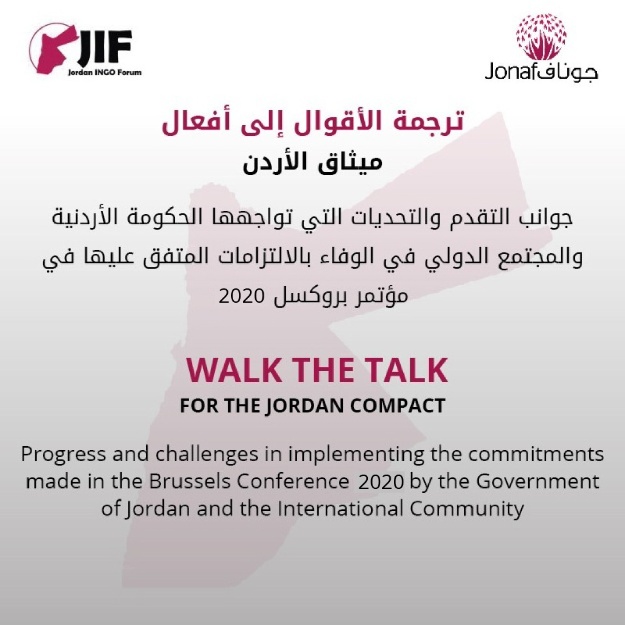The Jordan INGO Forum (JIF) and the Jordanian NGOs Forum (JONAF) launched the 2021 Walk the Talk report on progress and challenges faced in implementing the commitments made by the Government of Jordan and the International Community under the Jordan Compact and at subsequent Brussels meetings in 2017, 2018, 2019, and 2020.
As with previous years, this year’s Walk the Talk assesses education, livelihoods, protection, and health for Syrian refugees in Jordan prior to the Brussels 5 Conference on March 30, which will occur virtually. The report is based on assessments and surveys taken over the past year to track progress and barriers faced, as well as on civil society feedback from both international and national NGOs. It looks to highlight the challenges faced by Syrian refugees, as well as provide evidence-based recommendations as to how the International Community and the Government of Jordan can support these communities and address ongoing and emerging issues.
This year the conference comes at a time following one year of the outbreak of the pandemic, as well as a decade of conflict and protracted displacement in Syria. The COVID-19 crisis has posed immense health challenges to all communities in the Kingdom and strained health infrastructure and capacities. Jordan has been forced to grapple not only with mitigating the spread of the virus, but also to address the secondary impacts of the response, which encompass exacerbated protection risks, such as with regards to SGBV and child protection; socioeconomic concerns related to the loss of livelihoods; school closures and barriers to online learning; and increased psychological stress. Additionally, ten years of displacement of Syrian refugees has resulted in increased vulnerabilities with highly limited pathways to durable solutions. Thus, JIF and JONAF continue to advocate not only for the inclusion of refugees in national response plans and social protection schemes to ensure no one is left behind, particularly in the COVID-19 response, but also to maintain an emphasis on longer-term approaches for Syrian refugees and integrating the humanitarian-development nexus and resilience programming into policies and practice.
The need for support is greater now than before, both to assist the Government and to strengthen and include civil society in the overall response. Multi-stakeholder partnerships across and between sectors are critical to incorporate local actors, strengthen capacities, and place refugee and host community voices at the center of all interventions. Furthermore, after a decade of displacement, assistance through flexible funding is necessary to shift to longer-term responses and promote the resilience of communities. All stakeholders ranging from government actors, INGOs and NNGOs, community-based organizations, donors, and the private sector have a responsibility to assist the Kingdom not only in addressing the challenges Syrian refugees face through programming and the COVID-19 response but also in continuing to promote principled humanitarian policies and assistance.


